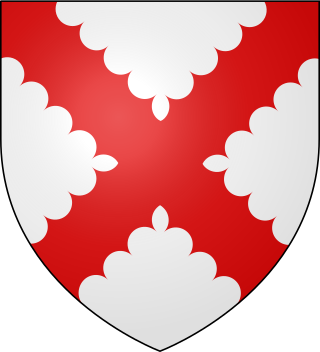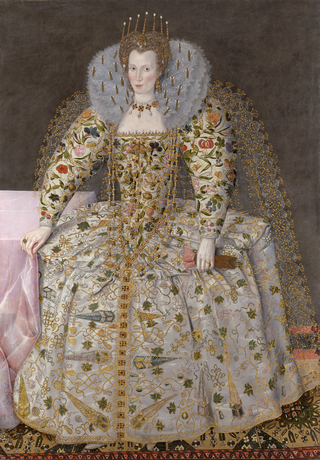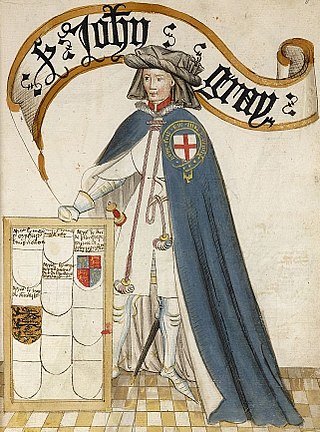
Thomas West, 3rd Baron De La Warr, was an English nobleman, for whom the bay, the river, and, consequently, a Native American people and U.S. state, all later called "Delaware", were named. A member of the House of Lords, from the death of his father in 1602 until his own death in 1618, he served as the governor of Virginia from 1610 to 1611.

Earl of Derby is a title in the Peerage of England. The title was first adopted by Robert de Ferrers, 1st Earl of Derby, under a creation of 1139. It continued with the Ferrers family until the 6th Earl forfeited his property toward the end of the reign of Henry III and died in 1279. Most of the Ferrers property and the Derby title were then held by the family of Henry III. The title merged in the Crown upon Henry IV's accession to the throne in 1399.

Baron FitzWalter is an ancient title in the Peerage of England. It was created on 24 June 1295 for Robert FitzWalter. The title was created by writ, which means that it can descend through both male and female lines.
The title of Baron Grey of Codnor is a title in the peerage of England.
Baron Cromwell is a title that has been created several times in the Peerage of England. The first creation, which was by writ, was for John de Cromwell in 1308. On his death, the barony became extinct. The second creation came in 1375 when Ralph de Cromwell was summoned by writ to Parliament as Lord Cromwell. His grandson, the third baron, served as Lord High Treasurer to King Henry VI. However, on his death in 1455, the barony fell into abeyance between his nieces Maude and Joan. On Joan's death in 1490, the abeyance was terminated in favour of Maude, the fourth holder. When she died childless in 1497 the peerage once again fell into abeyance, this time between the daughters of the first baron. The title remained in abeyance for over 400 years. However, in 1922 the Committee for Privileges of the House of Lords reported in favour of the petition for the termination of the abeyancy of Selina Frances Bewicke-Copley. She was the daughter of Sir Charles Watson Copley, 3rd Baronet, and one of the co-heirs of Maud, daughter of the first baron Cromwell. Selina died in 1923 and in July of the same year, the abeyance was terminated in favour of her son Robert Godfrey Wolesley Bewicke-Copley, who became the fifth baron. He notably served as Lord Lieutenant of Leicestershire. As of 2010 the ancient barony is held by his grandson, the seventh baron, who succeeded his father in 1982. Having lost his seat in the House of Lords under the House of Lords Act 1999, in April 2014 he was elected at a hereditary peers' by-election as a Crossbencher.

Baron Sudeley is a hereditary title that has been created three times in the history of Britain, twice in the Peerage of England and once in the Peerage of the United Kingdom. The first creation came in the Peerage of England in 1299 when John de Sudeley was summoned to Parliament as Lord Sudeley. On the death of the third Baron in 1367 the title fell into abeyance. The abeyance was terminated in 1380 when Thomas Boteler, the fourth Baron, became the sole heir. The sixth Baron was created Baron Sudeley by letters patent in 1441. He served as Lord High Treasurer from 1444 to 1447. On his death in 1473, the 1441 creation became extinct while the 1299 creation once again fell into abeyance.

The Dukedom of Chandos was a title that has been created twice in the Peerage of England. First created as a barony by Edward III in 1337, its second creation in 1554 was due to the Brydges family's service to Mary I during Wyatt's rebellion, when she also gave them Sudeley Castle. The barony was elevated to a dukedom in 1719, and it finally fell into abeyance in 1789, after 452 years.

Grey Brydges, 5th Baron Chandos of Sudeley Castle in Gloucestershire, was an English nobleman and courtier.

John Tiptoft, 1st Baron Tiptoft was a Knight of the Shire for Huntingdonshire and Somerset, Speaker of the House of Commons, Treasurer of the Household, Chief Butler of England, Treasurer of the Exchequer and Seneschal of Landes and Aquitaine.

Catherine Howard, Countess of Nottingham, was a cousin, lady-in-waiting, and close confidante of Elizabeth I of England. She was in attendance on the queen for 44 years.
Baron Scales is a title in the Peerage of England.

John Bourchier, 1st Baron Berners, KG was an English peer.

Thomas Scales, 7th Baron Scales was an English nobleman and one of the main English military commanders in the last phase of the Hundred Years' War. The son of Robert de Scales, 5th Baron Scales, he succeeded his brother Robert de Scales, 6th Baron Scales as baron.
Sir Robert Belknap was a senior English judge.

John de Grey, 1st Baron Grey de Rotherfield KG was an English soldier and courtier. John was the son and heir of Sir John de Grey of Rotherfield, by Margaret, daughter of William de Odingsells.

Lord Robert de Scales was a Knight Templar and loyal supporter of Edward I in his campaigns in Wales, Scotland, France and Flanders. In 1299 he, and his heirs, were bestowed with the title, Baron Scales and were henceforth known as 'Lord Scales'. He was a signatory of the Baron's Letter to Pope Boniface VIII in 1301.
Sir Robert de Scales was engaged in several military expeditions. In 1337, he went on the Kings Service overseas with Robert d'Ufford, 1st Earl of Suffolk and Peter de Scales. He was summoned to Parliament from 1343 until his death in 1369.
Roger Scales, 4th Baron Scales (1354–1387) was one of the 'eminent persons' forced by the rebels to march with them upon the insurrection of Jack Straw in 1381. He was a commissioner of the peace for Cambridgeshire and Norfolk for many of the years between 1373 and 1386. He was summoned to Parliament from 1376 until his death in 1386. He attended the Coronation of Richard II in 1377.

Sir John Howard, of Wiggenhall and East Winch, in Norfolk, England, was a landowner, soldier, courtier, administrator and politician. His grandson was John Howard, 1st Duke of Norfolk, the great-grandfather of two queens, Anne Boleyn and Katherine Howard, two of the six wives of King Henry VIII.

The title Baron Cobham has been created numerous times in the Peerage of England; often multiple creations have been extant simultaneously, especially in the fourteenth century.













